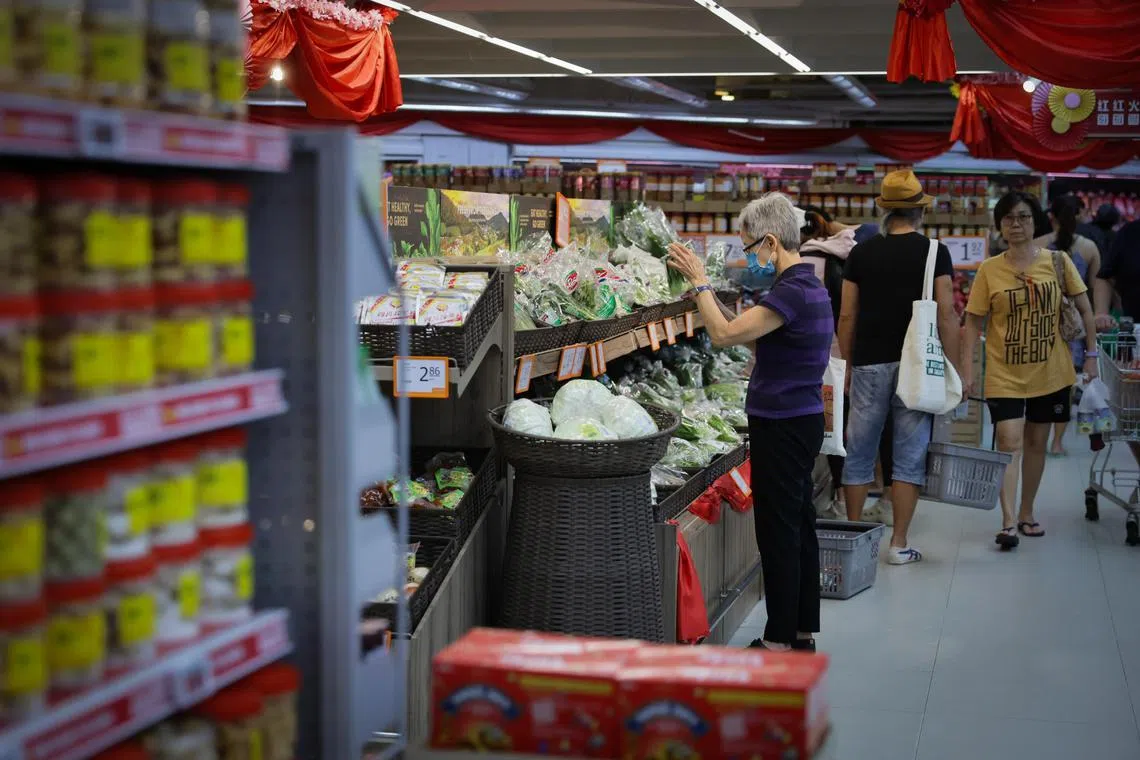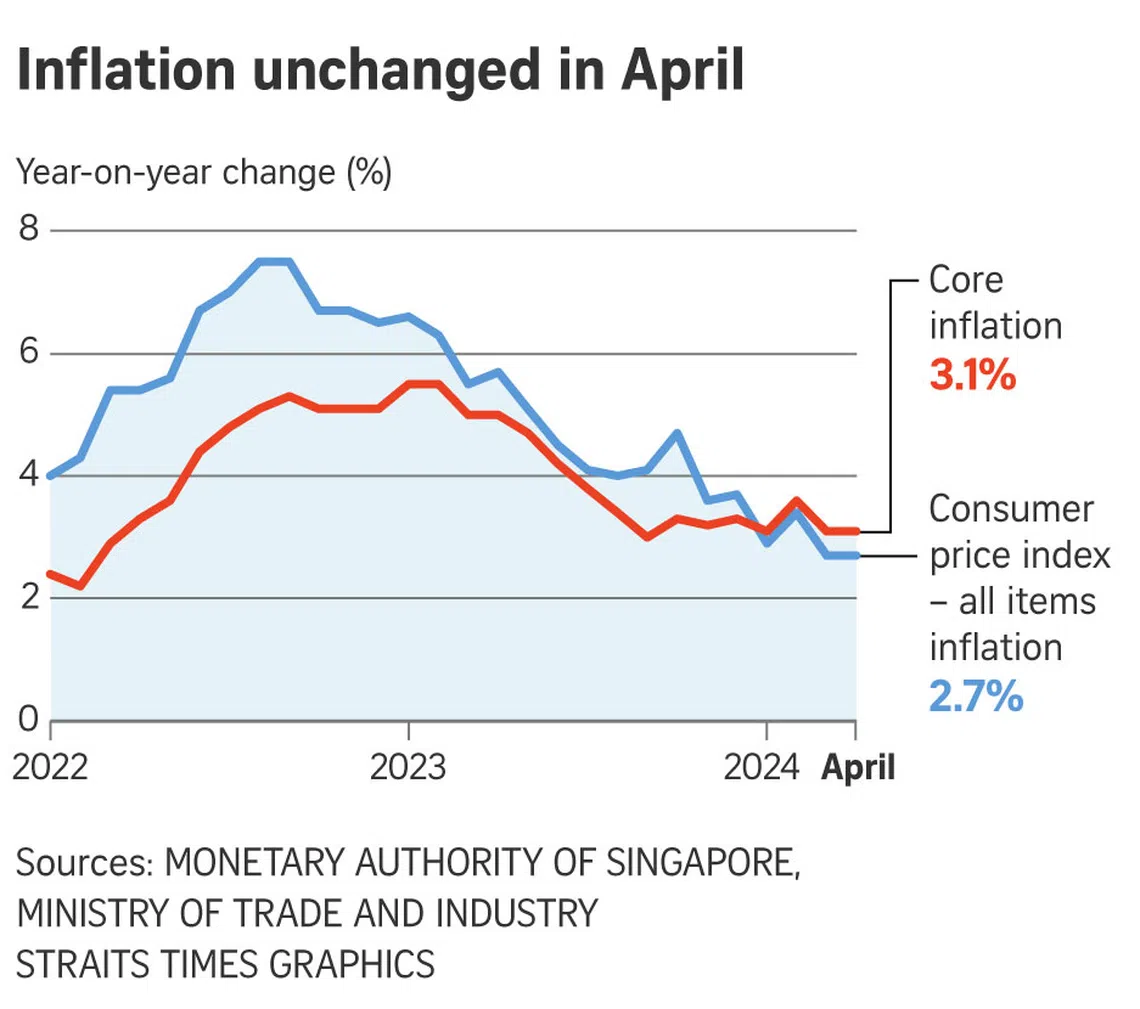Singapore core inflation holds steady at 3.1% in April as price increases for food and services ease
Sign up now: Get ST's newsletters delivered to your inbox

Overall inflation also stayed the same, at 2.7 per cent year on year.
PHOTO: ST FILE
SINGAPORE – Singapore’s core inflation was unchanged in April as more gradual increases in services and food prices offset higher inflation for electricity and gas, and retail and other goods.
However, risks remain as global factors such as supply chain disruptions, adverse weather conditions and geopolitical tensions could drive up import costs.
Core inflation – which excludes accommodation and private transport costs to better represent the expenses of Singapore households – came in at 3.1 per cent year on year in April, unchanged from March,
Overall inflation also stayed the same, at 2.7 per cent year on year. It had dropped to that figure in March, from 3.4 per cent in February, marking its lowest level since September 2021.
In April, an increase in private transport costs was offset by lower accommodation inflation, even as core inflation remained unchanged.
Month on month, overall inflation edged up by 0.1 per cent, while core inflation rose by 0.4 per cent.
Inflation for retail and other goods rose to 1.6 per cent year on year, up from 0.7 per cent in March, due to a hike in water prices, a steeper increase in the prices of personal items, and a smaller decline in the prices of clothing and footwear.
National water agency PUB said in September 2023 that water will cost consumers an additional 50 cents per cubic m, starting with a 20-cent increase in April 2024, and then a 30-cent rise in April 2025.
This means that most households will fork out an additional $4 to $9, excluding goods and services tax, for their monthly water bill by 2025, said PUB, adding that lower- and middle-income households will get help to offset some of the price increase.
Private transport costs also increased in April as car prices fell at a slower rate, and petrol prices rose more steeply.
Electricity and gas inflation picked up pace too, rising to 7.6 per cent year on year in April, up from 4.8 per cent in March, due to larger increases in tariffs.
“While electricity and gas tariffs for the period of April to June are lower than that for the period of January to March, they were higher in year-on-year terms in April 2024 due to the low base in April 2023,” noted MAS and MTI.
Meanwhile, food inflation edged down as the prices of non-cooked food and food services rose at a slower pace.
DBS Bank economist Chua Han Teng said it was encouraging that food inflation continued to decelerate to hit 2.8 per cent year on year in April, its lowest level since early 2022.
“We continue to expect core inflation to cool and average lower in 2024 versus 2023,” he said.
He noted that signs of easing labour cost pressures can be seen from the Manpower Ministry’s forward-looking polls in the first quarter, which showed a decline in the proportion of companies that intend to raise wages in the next three months.

Besides food inflation, accommodation inflation also eased in April, due to smaller increases in rents and the cost of housing maintenance and repairs.
Services inflation also dipped, on the back of a larger decline in airfares and a more modest pace of increase in holiday expenses.
Core inflation is expected to stay on a gradual moderating trend over the rest of 2024 and step down more discernibly in the fourth quarter, as import cost pressures continue to decline and tightness in the domestic labour market eases, said MAS and MTI.
“Crude oil prices have been volatile in recent months but the global prices of most food commodities, as well as intermediate and final manufactured goods, have remained relatively stable or continued to decline,” they said.
“In addition, inflation for services associated with overseas travel should moderate further over the course of the year as supply conditions in the air transport and hospitality sectors around the world improve.”
The gradually strengthening Singapore dollar trade-weighted exchange rate should also continue to temper Singapore’s imported inflation in the months ahead, they added.
In April, MAS kept unchanged its monetary policy stance
On the domestic front, increases in unit labour costs are expected to slow over the year in tandem with the cooling labour market. Businesses are likely to continue passing on the earlier increases in labour and other business costs to consumers through higher prices, albeit at a reduced pace.
Private transport inflation is also expected to moderate from 2023 with a larger projected supply of certificates of entitlement in 2024, while accommodation inflation is also likely to continue easing as the supply of housing units available for rental increases over the year.
MTI and MAS on May 23 maintained their estimates for both core and overall inflation in 2024 at 2.5 per cent to 3.5 per cent.
But risks to the inflation outlook remain, they said. Fresh geopolitical shocks and adverse weather events around the world could put upward pressure on global energy and food commodity prices, as well as shipping costs.
Domestically, a stronger than expected labour market could also cause wage growth to accelerate again. Conversely, an unexpected weakening in the global economy could induce a greater easing of cost and price pressures, they said.
OCBC Bank chief economist Selena Ling said that the overall and core inflation numbers have been “well-behaved” in 2024 so far, and there are no indications that ongoing Middle East tensions have permanently contributed to higher energy prices.
Her bank expects overall inflation for the whole of 2024 to come in at 2.8 per cent year on year, down from a previous forecast of 3 per cent. It expects core inflation to stand at 3 per cent, compared with 3.1 per cent previously.
RHB Bank acting group chief economist Barnabas Gan said that higher import prices are set to elevate consumer prices in Singapore in the upcoming quarters, due to the country’s significant reliance on imported goods, including essentials like food and energy.
As global factors drive up import costs, businesses here will likely pass these costs on to consumers, leading to sticky inflation that could spur a wage-price spiral, he said. His bank expects overall inflation of 3.5 per cent in 2024, and core inflation of 2.8 per cent.
Globally, interest rates may also stay elevated for an extended period of time as countries combat sticky inflation. Mr Gan added that high global rates can lead to tighter financial conditions in Singapore, potentially increasing borrowing costs and operational expenses for businesses, which may also be passed on to consumers.



